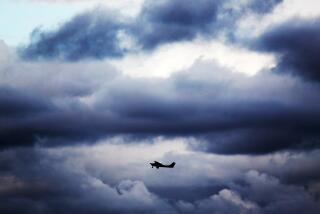U.S. Pushes for Ban on Spraying
- Share via
A campaign by the U.S. Department of Transportation has pared the number of countries requiring routine spraying of insecticide in passenger-filled aircraft from 17 one year ago to six. It is a campaign that U.S. Transportation Secretary Federico Pena termed a dramatic success but that some critics contend has not yet gone far enough.
At issue is the practice of spraying insecticides on airplanes. The countries that still allow it on full aircraft are Argentina, Grenada, India, Kiribati, Madagascar and Trinidad and Tobago. Six others--Australia, Barbados, Fiji, Jamaica, New Zealand and Panama--require insecticide treatment but allow it when planes are empty.
Results of the U.S. campaign have been significant. When DOT began its letter-writing campaign in 1994, 25 countries required spraying while passengers were on board. But while the number has been trimmed significantly and DOT is continuing “communication” with the six remaining countries who have not complied with the request, according to DOT spokesman Bill Mosley, some environmentalists and consumer advocates say the next step should be to eliminate applications of pesticides, even when planes are empty.
Currently, two methods of disinsection, as the practice is known, are approved by the International Civil Aviation Organization, a multinational group devoted to aviation safety and standards. A chemical called d-phenothrin, also found in Black Knight Roach Killer, can be sprayed throughout the cabin and the insecticide, permethrin, can be applied to interior surfaces of the cabin. (But a 1994 label change required by the U.S. Environmental Protection Agency makes d-phenothrin spray produced in the United States unacceptable for use when passengers or crew are present on aircraft. However, airlines can exhaust existing inventories.)
While the practice is meant to stem the flow of disease-carrying and crop-damaging insects, it is not effective, U.S. officials contend. Even though routine spraying of aircraft was discontinued in the United States in 1979, there have been no outbreaks of insect-borne diseases here attributed to imported insects, according to DOT.
Reports of ill effects from the insecticides spurred the Department of Transportation effort to eliminate spraying. DOT would also like to require airlines and travel agents to notify passengers before they buy tickets if the country they are traveling to requires airline insecticide treatment. That proposal is pending, Mosley said.
While the elimination of chemical spraying in filled aircraft is an important achievement, many believe the next step should also be to eliminate spraying of empty cabins. “They literally soak the airlines,” said David Stempler, an independent airline travel consultant in Washington, who was formerly executive director of the International Airline Passengers Assn., an organization of frequent travelers. The chemicals could be strong enough to be inhaled on subsequent flights, he contended.
“Soaking is too strong a word,” said a Qantas Airways spokeswoman. “The interior cabins are sprayed every 56 days in Australia. It takes an hour and within an hour, it’s all dry.”
The International Airline Passengers Assn. applauds the campaign, but has not formally called for an end to spraying of empty cabins, said Marty Salfen, a spokesman for the Texas-based organization that serves 400,000 travelers worldwide. “We might,” he said, “although there’s no time line for doing so.”
Also being questioned is who bears responsibility for notifying passengers if spraying will take place. Some believe it belongs to the DOT, not the airlines or travel agents, said Steve Loucks, a spokesman for the American Society of Travel Agents, an organization of 27,000 travel agents based in Alexandria, Va. “It’s not that consumers don’t have a right to know,” he said, “but that there is no central clearinghouse of information [available to them].” The notification task, he said, is best left to the government.
Meanwhile, sensitive people scheduled to fly on an aircraft that will be sprayed might consider taking another route or using an antipollution mask, experts advise.
“A typical painter’s mask will help a little,” said Dr. Robert Eitches, an allergist on staff at Cedars-Sinai Medical Center and UCLA assistant professor of pediatrics. Other options are masks with activated charcoal or canister-type masks, available through travel catalogs. But Eitches doubts most travelers would wear the canister-type masks due to their odd appearance.
Travelers with asthma, allergies and other problems should consult their doctor before departing for a country that sprays, Eitches said. Depending on a patient’s condition, he might recommend inhaling anti-inflammatory medicine prior to flight or the use of long-acting asthma medication.
The Healthy Traveler appears the second and fourth week of every month.
More to Read
Sign up for Essential California
The most important California stories and recommendations in your inbox every morning.
You may occasionally receive promotional content from the Los Angeles Times.












